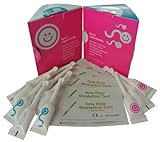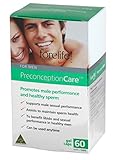Sex is supposed to be fun but not when you’re trying to get pregnant, and nothing is happening.
This is when sex becomes a chore, and all sorts of frustrations suddenly start to bulldoze you and your spouse. What could you be doing wrong? Who has infertility problems?
Before you start pointing fingers, you should look into different scenarios that can contribute to the problem, such as lubricants.
Yes, some lubricants have hurt sperm’s motility, making it harder to reach the egg. So if you are using lubrication, stop.
It is possible that the product you are using is ruining your plans.
What do lubricants have to do with it?
The pH of a woman’s vagina swings from acidic to alkaline during a menstrual cycle and around ovulation. The vaginal pH is highly acidic, ranges from 3.5 to 4.5, and a sperm can survive a pH range of 7 to 8.5. During intercourse, the vaginal pH rises to make alkaline environment for sperms to swim to reach eggs and fertilize them. [1, 2]
But standard lubricants have a pH of between 4 and 5.5 making it overly acidic.
This means if you use one during ovulation, the sperm’s performance and survival will be jeopardized.
The ion concentration level in lubes also hinders conception.
Sperms will have difficulty swimming through the obstacles that high concentration of ions creates [3]. It will also cause reduced sperm functions and DNA damage.
These, more than anything, underlines the importance of choosing fertility-friendly lubricants.
How do you do this exactly?
Choose a product with the right pH level
Now that you know the pH level that helps sperms survive and reach the eggs, you should ensure that the lubricant you want to buy has a pH similar to fertile cervical mucus, which is between 7 and 10.
Choose a product that is FDA-approved for conception.
The FDA approved some lubricants for use by couples trying to conceive. This is important since a lubricant only gets FDA qualification if it is clinically proven to be compatible with the process of fertilization, the sperm, embryo, and gamete.
Best Fertility-Friendly Lubricants
Pre-Seed

This is the most recommended lubricant to use when trying to get pregnant.
It is developed by doctors, clinically proven to be fertility friendly, and is used by fertility clinics. What’s great about this product is that it mimics a woman’s fertile fluids, providing a safe and alkaline environment for the sperm.
Pros
- It is fertility friendly.
- Supports sperm quality and performance.
- Specially formulated for couples trying to get pregnant.
- It has a lower ion (salt) concentration that prevents irritation.
- It has preservatives approved for human use.
- It has striations that facilitate the sperm’s upward swim.
Cons
- It contains Parabens
- It contains Sodium Hydroxide
- It looks tick and dries fast.
Although Parabens are known to be harmful to sperms, the content in Pre-Seed is proven safe and is a better choice than natural alternative preservatives, such as EDTA and Vitamin C. Overall; it is a great product to use. It comes with a non-reusable applicator.
SASMAR Conceive Plus Personal Lubricant

Developed by doctors and designed for couples trying to conceive, Conceive Plus is a fertility-friendly personal lubricant that increases your chances of getting pregnant. It uses a patented formula that is designed to enhance the motility and viability of sperm.
It is isotonic and has a balanced pH level that mimics the natural fluids during ovulation.
Comes with pre-filled applicators to ensure that the lube hits the right spot and increase effectiveness.
Pros
- Supports sperm viability and motility.
- Increases conception naturally and safely.
- Cleared by the FDA for couples trying to get pregnant.
- Clinically tested safe to use.
- Creates a fertility-friendly environment for the sperm.
- Contains calcium and magnesium that help the sperm reach the egg.
- Does not dry out.
Cons
- Some claim it smells like plastic.
- Could have a numbing effect for some.
- May require frequent re-application.
Astroglide TTC Trying to Conceive

This is a water-based personal lubricant that is friendly to sperms and supports couples trying to conceive or get pregnant.
It supports sperm motility and is compatible with the sperm, embryos, and oocytes, and contains fructose and galactose that provide a food source and mimics seminal fluid.
It comes with an applicator. When used with a condom, the lubricant must not be applied directly from the applicator.
Pros
- Safe water-based lubricant.
- Does not harm sperm because of its adjusted pH and isotonic levels.
- Easy to use.
- No mess, with an ultra-thin and natural feeding.
- Advanced pre-application is not required.
Cons
- Gets sticky quickly
- May cause vaginal dryness for some
Forelife Fertility Care Sperm-safe Personal Lubricant
This product not only creates a safe environment for the sperm but also increases pleasure.
It can be used anytime and when trying to get pregnant.
Pros
- Easy to use.
- Creates an optimal environment for the sperm to swim and survive.
- Boosts sexual pleasure.
- Does not contain Parabens.
Cons
- Contains glycerol.
Yes Baby

This is an organic personal lubricant that is sperm friendly.
It is provided as a 2-pack conception lubricant system that includes ovulation sticks that support self-management and gels for conception and re-balancing of pH levels.
Pros
- Comes with an organic certification from soil association
- Pure and natural
- Holistic vaginal pH management
- Free of glycerin and Parabens
Cons
- Can be too sticky for some
- Single-use tubes can be inconvenient for some
- May cause reaction to sensitive people
The conception lubricant system from Yes Baby is a clever idea, especially where wastage is a primary concern. Some people, however, would prefer to buy lubricants in one sizeable tube with applicators than single-use packs.
Other Lubricants
Other organic fertility-friendly lubricants you should check out are the Aloe Cadabra Personal Pleasure Lube and the Sliquid Organics Oceanics Natural Intimate Lubricant.
Both of these products are glycerin and Paraben-free, making them the safest and friendliest lubricants for sperms.
With the information listed above, choosing a lubricant that supports sperm motility rather than hinders it is easier.
Just make sure to read the label to check the ingredients and FDA approval because even when a product is marketed as fertility-friendly, it could still contain harmful substances.
Are you ready to go shopping? Check out fertility-friendly lubricants online today.
References
-
1. https://www.healthline.com/health/womens-health/vaginal-ph-balance
2. https://www.kindara.com/blog/could-a-vaginal-ph-imbalance-be-preventing-you-from-getting-pregnant
3. https://www.ncbi.nlm.nih.gov/pmc/articles/PMC3947082/




